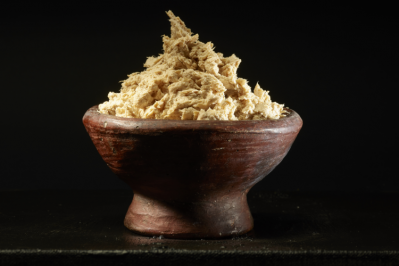M&S and 3F BIO collaborate for mycoprotein vegan range

Marks and Spencer has an 18.5% share of the UK’s plant-based market, a figure that the company hopes to grow through a new approach to innovation.
This coming January, the retailer is launching the Innovation Hub. This specialist team will be tasked with galvanising emerging trends, consumer insight and the latest technology to ‘spearhead sustainability solutions’ in food development, including plant-based innovation under its Plant Kitchen range.
“Creating a dedicated team with the sole purpose of driving disruptive innovation will support us in being more relevant to our customers. But it’s not just about relevancy today; the Innovation Hub will enable us to track emerging trends and insights, so we’re one step ahead in responding to our customers’ needs in the future,” Stuart Machin, M&S Food’s Managing Director, commented.
A ‘key part’ of the Innovation Hub’s remit will be to partner with technology-led companies to drive the ‘food transformation’. And the first such partnership M&S has unveiled is with 3F BIO, a company that uses naturally occurring fungi and a large-scale fermentation process to produce mycoprotein.
Mycoprotein: ‘We are hugely excited by the application possibilities’
3F BIO is a biotech firm that produces ABUNDA, a mycoprotein ingredient made through a zero-waste fermentation process.
The ingredient is produced in a similar way to the fermentation of beer. 3F BIO’s technology results in an end product with a meat-like texture that is high in both protein and fibre.
“We are delighted about this collaboration with Marks and Spencer,” commercial director Andrew Beasley said.
“We are hugely excited by the application possibilities of mycoprotein. ABUNDA mycoprotein is a fermented food ingredient, and it is truly special, not only because we can make delicious foods with it, but because it is also sustainable, healthy and nutritious.”
Importantly for food brands, mycoprotein is a clean label solution for plant-based product development, according to 3F BIO. “So many plant protein foods today contain way too many ingredients. With mycoprotein, we can make foods with short ingredient lists, which are common to our kitchens today.”
The ingredient offers other attributes that mean it can be leveraged to have a positive impact on the environment and global nutrition. It is an ‘existing advantaged ingredient’ with an ‘established market role’ that, 3F BIO said, can produce ‘more sustainably and at a lower cost’ than ‘all other protein options’.
As a food ingredient company, 3F BIO will trade as ENOUGH and is building a high scale facility in the Netherlands to produce and sell mycoprotein as a food ingredient in 2022.
ENOUGH is planning to have 50k tonnes of installed capacity by 2027 and the company aims to produce 1M tonnes cumulatively within 10 years of launch.
Increasing interest in mycoprotein
Fermentation is increasingly recognized as a means of producing protein that is more cost effective and less environmentally damaging than animal-based alternatives.
A recent report from the Good Food Institute highlighted that 40-plus companies are active in growing protein with fermentation, with more than US$770m invested into fermentation companies in the last two years, primarily focussed on the US market.
3F BIO’s focus on leveraging business-to-business channels is somewhat distinct. Founded in 2015, 3F BIO describes itself as a ‘veteran’ in this sector. The company decided to concentrate its strategy on ingredient sales as this enables the ‘maximum impact and scale’.
This opens the door to retail private label innovation using mycoprotein. 3F BIO supports ‘any target customer’ with an in-house development team who ‘showcase the vision of tasting as good as the animal alternative’. The company has developed products ranging from meat-free sausage rolls, to plant-based pork steal alternatives and no-crab cakes.
According to Mike Hughes, insight director at FMCG Gurus, this ticks two important boxes for plant-based innovation: taste and price.
“As demand for plant meat continues to grow, the market will be driven by two factors – cost and innovation around taste and texture, so that products are seen to genuinely mimic the experience of eating real meat. Cost and affordability, especially in a recessionary environment, will be crucial for targeting a wider audience, especially those who are shopping on a strict budget. Addressing taste and texture will also be crucial when targeting the flexitarian market – the main drivers of the plant meat craze – who want products to be compromise free from a taste and enjoyment perspective and to mimic the experience of eating real meat. Currently consumers can be conscious about the taste and texture of some plant burgers and there will be rich pickings for brands that are able to address this,” he told FoodNavigator.
Hughes suggests that own label products do have a number of advantages: “Retailers can capitalize from economies of scale from a production and cost perspective, as well as control what products are stocked.
“Given the popularity of plant meat in the UK in recent years, there has certainly been a number of retailers that have launched new offerings to capitalize on this. Whilst brands and retailers are using a variety of ways to offer innovations – such as flavoring and protein sources – one way in which retailers can capitalize is through targeting both high end and economy occasions through having a tiered portfolio product range,” he advises.
Hughes continued, the buoyant nature of the UK plant-based category means that there is room for innovation from all sides. Indeed, product development is important to support continued growth with new launches spurring consumer interest.
“This means that there is an opportunity for M&S to target such a buoyant market – especially as the retailer tends to target the more premium end of food markets. What will be key for any new entrant is brand identity and some form of differentiation to make the product stand out.”



























